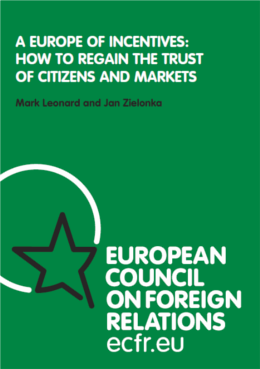A Europe of incentives: how to regain the trust of citizens and the markets
A more inclusive Europe is the sustainable solution to the crisis
After months of failed short-term fixes and mounting panic, European leaders from Merkel to Cameron are now agreed that the only sustainable solution to the euro crisis is political integration.
A new ECFR policy brief – ‘A Europe of incentives: regaining the trust of citizens and markets’ by Mark Leonard and Jan Zielonka – lays out how a more inclusive Europe could be achieved.
The paper also suggests ways to avoid a Two-Class Europe where decision making is dominated by powerful countries, the technocracy-populism trap and continued crushing austerity.
-
Crisis countries need to be relieved from excessive interest rate burdens that prohibit growth, for instance through moving towards Eurobonds or introducing a European debt redemption fund. (For other concrete measures see this recent ECFR paper.)
-
The gulf in competitiveness that lies at the heart of the euro crisis needs to be tackled with rewards for reform, rather than a punitive regime obsessed with rules and outcomes. Efforts need to be made to expand the single market in services, energy and the digital economy, and reinvigorate the vision of a Europe that brings prosperity.
- Europe needs to empower and involve its citizens rather than alienate them. For instance a weekly council of national deputy prime ministers could make Brussels more accountable and democratic, and a second European Parliament chamber could be created from national MPs to help sign off national budgets.
“Angela Merkel says that political union is the key to fiscal union, but Europe is becoming an “apolitical union” where elections allow citizens to change governments but not policies, and technocrats rule the roost. What is needed is a new reform agenda that is generous, flexible, empowering – a Europe of incentives.” – Mark Leonard
“The current EU is not strong enough to get itself out of its present crisis or to prevent future ones. The choice that the eurozone’s leaders have been avoiding has become inescapable: economic and political integration or dissolution” – Jan Zielonka
Notes:
- This paper, like all ECFR publications, represents the views of its author, not the collective position of ECFR or its Council Members.
- This paper is part of ECFR's Reinventing Europe project, which looks at how Europe can rethink its medium to long term future once the immediate crisis recedes. The Reinventing Europe project is supported by Steven Heinz and Thomas Leysen.
- The European Council on Foreign Relations (ECFR) is the first pan-European think-tank. Launched in October 2007, its objective is to conduct research and promote informed debate across Europe on the development of coherent and effective European values based foreign policy.
The European Council on Foreign Relations does not take collective positions. ECFR publications only represent the views of their individual authors.



